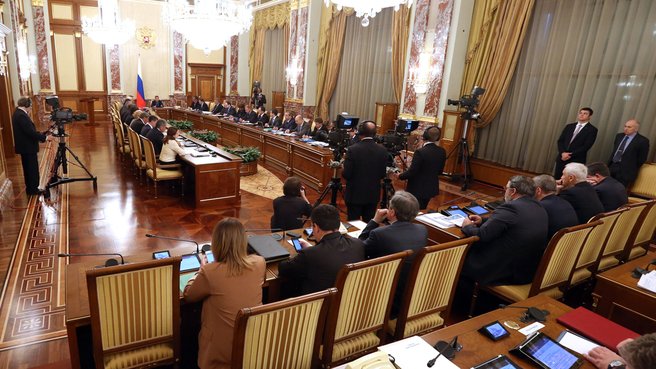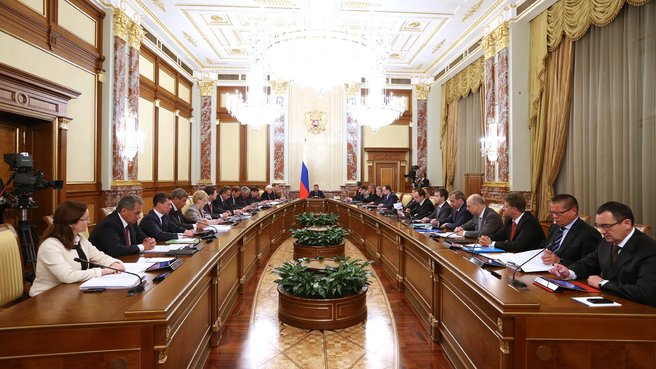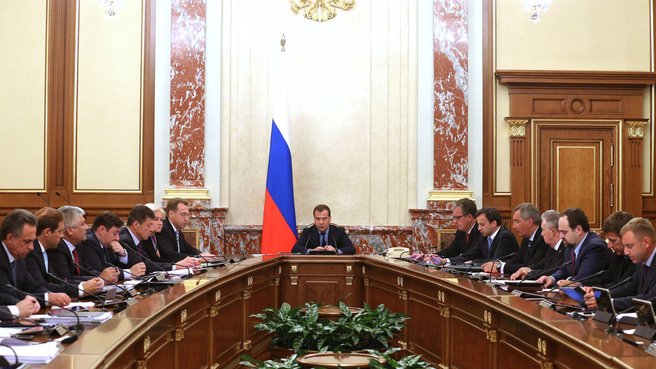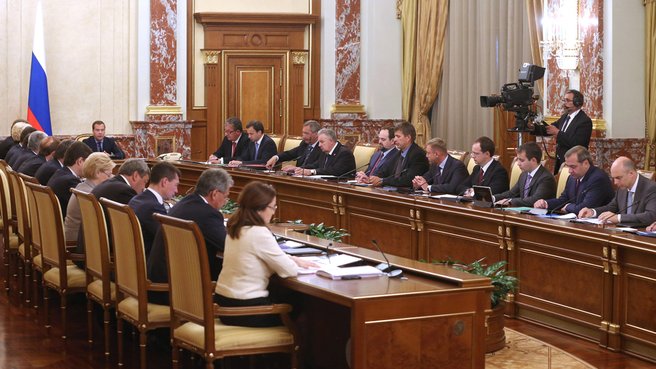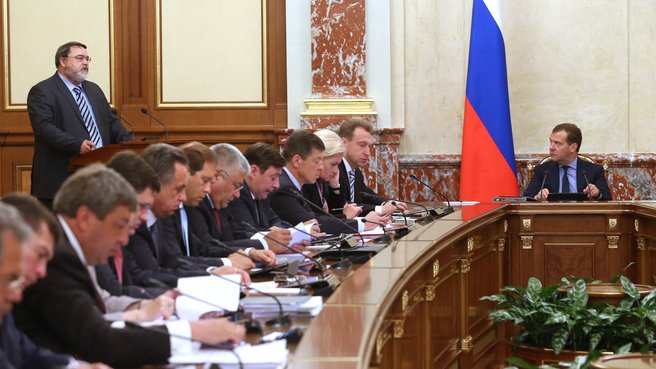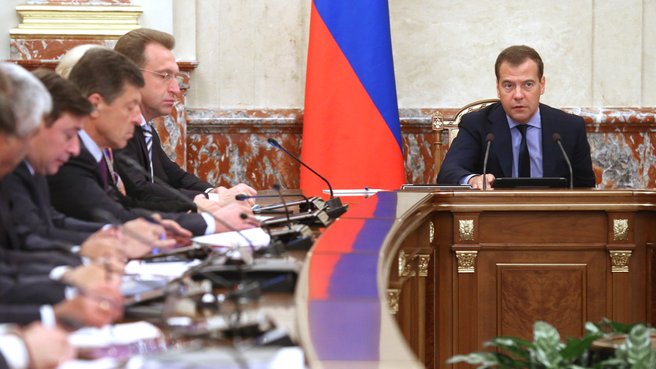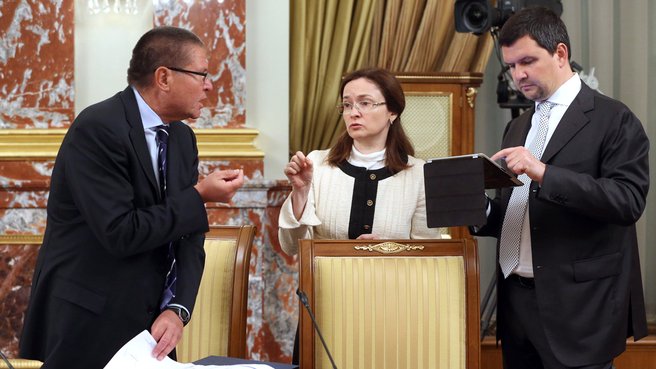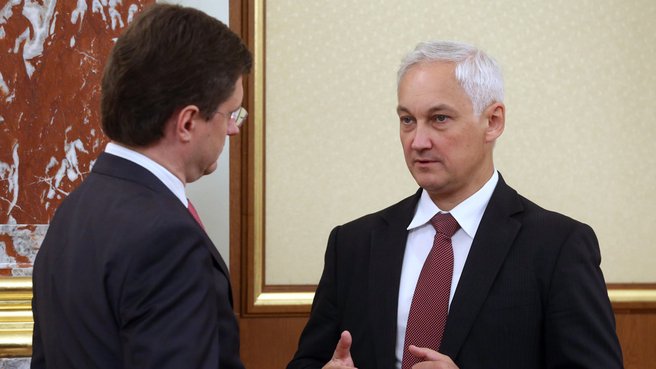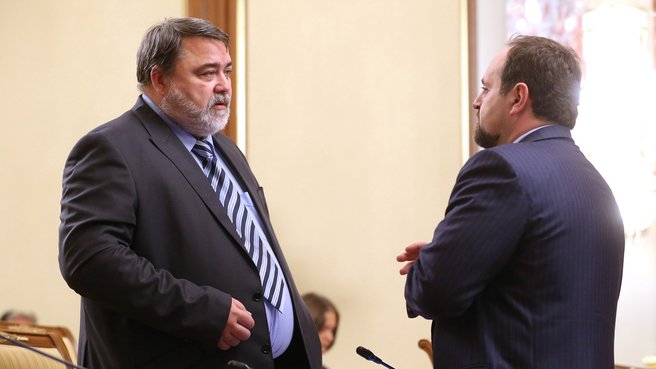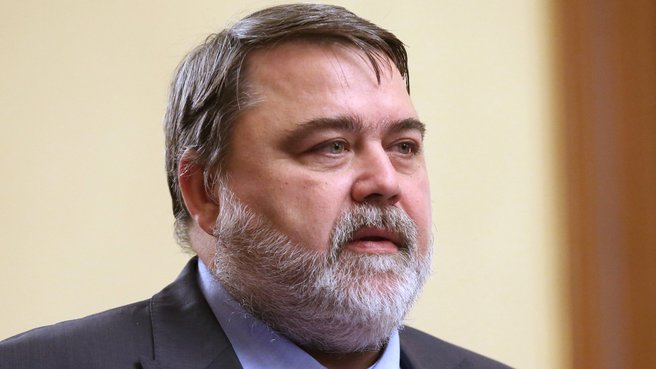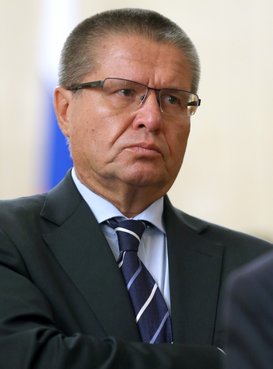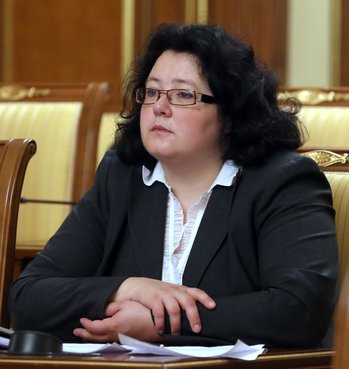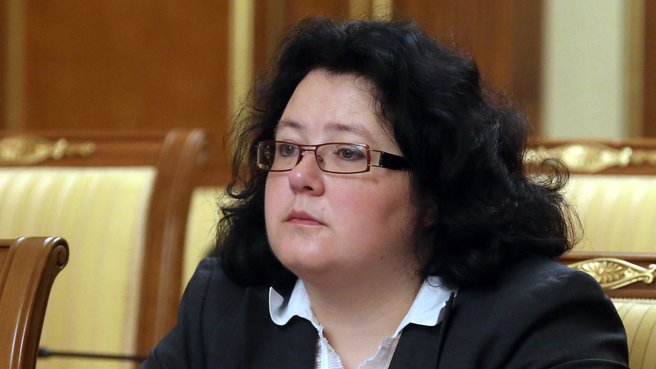Agenda: An annual report on competition in Russia, a plan of measures to accelerate economic growth and 11 other issues.
Dmitry Medvedev’s opening remarks
Report on competition in Russia by Igor Artemyev
Transcript:
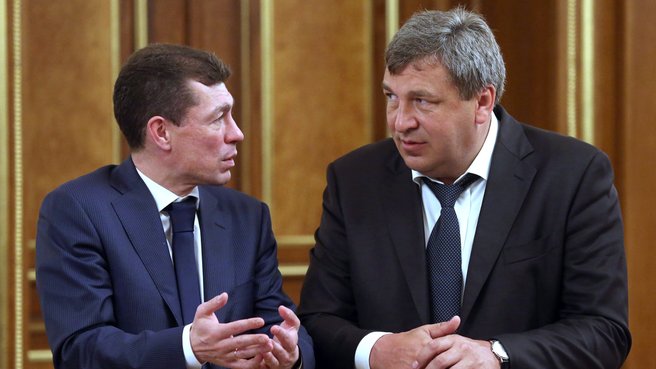
Minister of Labour and Social Security Maxim Topilin and Minister of Regional Development Igor Slunyayev
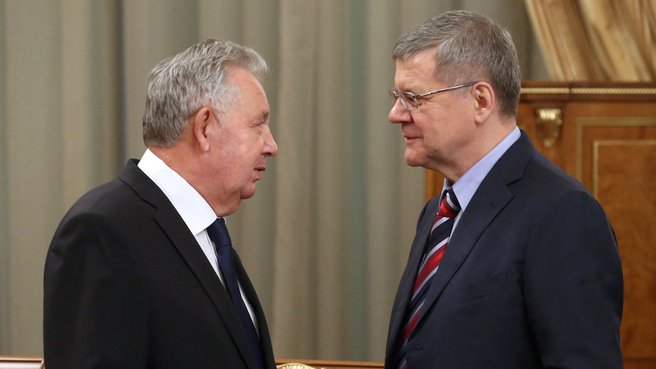
Minister for the Development of the Russian Far East Viktor Ishayev and Prosecutor General Yury Chaika
Government meeting
Dmitry Medvedev: Good afternoon. A few words about our agenda today: we will be discussing the development of competition. The head of the Federal Antimonopoly Service will report on the situation in some markets. I’d like to remind you that according to the rules, such a report is to be made every year. As you surely know, it has been prepared with contribution from the business and expert communities.
Work is in progress on ways to simplify the licensing procedure, to ensure equal access to energy and infrastructure and to reduce the excessive number of government facilities. Roadmaps and programmes are approved, but frankly speaking, there has not been major change. This view is shared by the bulk of business leaders and experts.
We have exacting antimonopoly legislation, but competition is quite weak. There are similar problems in the commodity markets, at natural monopolies and in the system of government purchases. There are administrative and financial barriers and limited access to transport infrastructure. The licensing procedures are still expensive and take too long, even though certain progress has been made in this area. These limitations have a negative impact on small and medium-sized businesses, as well as on everyone who uses this government service. Our economy is still not very competitive, given overstated prices, investments that are not always used properly and inadequate technological standards. This is why we have been working together to change our economy for the better and to make it competitive.
We must certainly promote competition in the spheres that concern the majority of our people. This also concerns the quality of life, which depends on housing and utilities, public transport, communication services, healthcare and a number of other sectors.
It must be said that the standards of competition differ from region to region. They largely depend on the policy of the local authorities and the professionalism of the local managers who are responsible for economic development in their regions. We need to analyse the best regional practices, use this experience and introduce it in other regions.
Using the investment standard as the basis, we are developing a regional standard of competition, which will stipulate common requirements for the executive authorities. It would be good if the federal authorities, business associations and the expert community joined this work. There is one more very complicated and principled issue, namely, economic-growth incentives. We recently met with senior Government and Central Bank officials, and we discussed this issue. Today, the Minister of Economic Development will submit the relevant action plan.
Dmitry Medvedev: "We are developing a regional standard of competition, which will stipulate common requirements for the executive authorities. It would be good if the federal authorities, business associations and the expert community joined this work."
I would like to remind you that we proceeded based on specific GDP-growth forecasts while drafting the three-year federal budget. However, GDP growth subsided in the first half of 2013. As you know, the statistics are not encouraging. We all realise that these growth rates are not enough to ensure development. The causes have been repeatedly analysed, they are well-known. A range of measures was suggested that would make it possible to expedite economic growth. But, of course, we should keep in mind that objective factors hampering economic growth persist. I am talking about external and domestic factors. Under these conditions, we can focus on qualitative growth parameters, we simply have no other option. I am talking about the implementation of structural reforms and the use of available resources for the development of the technological potential.
Dmitry Medvedev: "The real sector of the economy is the pillar of long-term development. A number of state-support measures are stipulated for basic economic sectors. This includes measures to limit the increase in the prices and rates of natural monopolies, targeted subsidies to specific enterprises to facilitate their adaptation to new conditions relevant to Russia’s accession to the World Trade Organisation. All these measures must be implemented on time and in full volume."
Expanded investment activity and the attraction of so-called “long money” (long-term loans) is a key issue. We must work in several directions here, and the plan will be reported to us. I would like to note separately that there is nothing completely new here; nevertheless, this is the main aspect of our work. We must assess reliable mechanisms for investing National Welfare Fund assets and pension savings in those infrastructure projects, which we believe can be recouped, and which are currently being prioritised, including those using the public-private partnership. Another task is to provide affordable loans, especially for small and medium-sized businesses, and, of course, to improve the overall business climate. I am talking about the implementation of “road maps” and other decisions for accomplishing these objectives.
The real sector of the economy is the pillar of long-term development. A number of state-support measures are stipulated for basic economic sectors. This includes measures to limit the increase in the prices and rates of natural monopolies, targeted subsidies to specific enterprises to facilitate their adaptation to new conditions relevant to Russia’s accession to the World Trade Organisation. All these measures must be implemented on time and in full volume. Of course, we realise that this is not a cure-all, and we will monitor current developments. And, if necessary, we will make the necessary adjustments.
Please, let’s get down to work. I would like to give the floor to Head of the Federal Anti-Monopoly Service Igor Artemyev.
Igor Artemyev: Mr Medvedev and members of the Government. Today, under the law On Competition, the Federal Anti-Monopoly Service is submitting its seventh annual report on the state of competition in the Russian Federation.
This year was the first time that the Open Government discussed it so extensively. Slide 2, please. We discussed it with the Chamber of Commerce, the Russian Union of Industrialists and Entrepreneurs, Opora, Delovaya Rossiya and the Bar Association, to name a few. In a word, this document was widely debated, and many valuable observations and initiatives were incorporated in this report. We even had to create an extra volume that makes up about one-third of the entire report.
Nevertheless, this is the seventh report and the seventh volume over the course of a seven-year period of work, which, as always, offers an in-depth review of what happened over the last year and the overall situation on various markets. If you don’t find the markets that you are interested in in the seventh volume, they may well be in the sixth, fifth, or fourth volume, or will be covered in later releases. Thus, as always, we choose several key markets for a specific year or a few key issues for the development of competition for a particular year. This year, we have two such key issues: government procurement and competition at airports. The report covers these issues in detail. However, most importantly, the general section analyses the key trends, prospects and the specific steps that have been taken or that need to be taken.
In fact, as always, there are upsides and downsides that I guess we should also talk about today. This year is very important for us, because there are new institutional bodies that are engaged in promoting competition nationwide. Mr Medvedev, I’m referring to your decision to set up a Government Commission to Promote Competition and Support Small Businesses, headed by First Deputy Prime Minister Igor Shuvalov. The creation of an administrative body which takes system-wide decisions that are mandatory for the ministries helped achieve progress in promoting competition. We failed to achieve any success every time the government commission wasn’t involved, i.e., where we tried to do things ourselves or with the help of the Ministry of Economic Development or other departments. This shows that the government commission is very important from the point of view of implementing appropriate initiatives.
Slide 3, please. International estimates suggest that, unfortunately, the level of competition in Russia has dwindled over the past year. In particular, Russia lost several positions in terms of the intensity of competition on the commodity markets. However, I believe that, most likely, the emotional assessment of the experts is due, perhaps, not so much to the fact that we actually lost some ground in terms of comparable figures, but the fact that the growth of competition is extremely slow if you look at the major challenges that we are faced with in terms of demonopolising the markets, promoting the competition and the corresponding institutions.
Of course, it also reflects a pessimistic assessment of our business community.
The main issue has to do with large-scale nationalisation of the economy, administrative barriers and, of course, administrative resources. These three subjects are constant. Many Russian and foreign experts believe that with a minimum level of competition the administrative resource is a big problem. Of course, crisis-induced developments – not only in Russia but in the United States and Europe as well – have resulted in the public sector becoming even more dominant and strong. We should promote competition among small- and medium-sized businesses, which are the mainstay of the Russian economy, especially given the vastness of our territory. This is not happening yet on a qualitative level, although there have been some improvements.
Slide 4, please. First of all, I would like to mention a few bad things and then talk about the good ones. Natural monopolies in Russia are an eternal problem. Last year, we asked ourselves whether we need the law on natural monopolies at all. There was a directive by you and Mr Shuvalov. The Government Executive Office also worked on this issue. It's a key political issue. The Law on Natural Monopolies of 1995 puts them in a privileged position, whereas I believe that, on the contrary, we should be very demanding with regard to these major economic operators. If they are so big and important, and the entire economy depends on them, then we should hold them to a high standard. Meanwhile, the law is fairly lenient when it comes to them. In other words, the general law on competition for all business entities, be it private steel companies or any other, is tough, whereas the natural monopolies enjoy easier terms in this regard. This is the case because the law of 1995 made them part of a separate category, followed by laws on gas supplies, etc., which have consolidated this trend. Thus, it’s a key political issue, and I would like to focus on it once again.
Next slide please. This slide is about state unitary enterprises and municipal unitary enterprises. I believe that the Government decision on the programme related to privatisation and liquidation of these state-run entities on the competitive markets is of key importance. It is essential to implement the Government action plan exactly as it was approved by the Government. The so-called subsidised economy presents the main danger. State and municipal unitary enterprises are often subsidised from the budget or treated preferentially where they have access to the best pieces of property and so on. So, a small or a medium-sized private company will always lose in a competition with these state and municipal unitary enterprises, because it does not have access to subsidies and will never be able to make good market offers. Entire industries, such as utilities, public transport, and social transport are unable to work properly, because the whole place is hogged by just one subsidised state unitary enterprise. Multiply this artificial monopoly by tens of thousands of situations in our cities for all of the housing and utilities services, transport, social services and so on. This can be changed, of course, only by removing them from the market or by preserving them, but perhaps only in security and defence, because that’s where they are actually needed.
Next slide please. The key element required now to change the rules of the game are in fact quite simple documents that are called the Non-Discriminating Access to Industry Regulation. Of course, these are mainly the access rules for infrastructure. From my experience, I can tell that we have been trying to adopt the non-discriminating access rules in the communications industry. For instance, the regulation adopted by Gazprom will need the “non-" to be removed because theirs is a regulation of discriminating access. If we take railway regulation, it has absolutely nothing to do with reality as it is 10 years old, does not reflect the current state of things, and therefore cannot be applied.
We have quite good non-discriminating access rules – thanks to the hard work of all of the ministries and government agencies – in the energy and airport services. However, we have nothing of the kind for seaports and telecommunications. The part was now fortunately included in its entirety in the roadmap. If we monitor the progress of the roadmap events closely, we may obtain these crucial documents that will create a completely different environment in this area.
Slide number seven, please. A few more words about natural monopolies. I’m not going to talk about Gazprom as this is an issue to be discussed separately. I would like to speak briefly about rail transport. It is a huge and complicated problem that has been discussed for five years now. However, if we try not to overcomplicate it and stress too much about the details, I cannot honestly understand why our private companies cannot obtain locomotives, form their own trains, pay Russian Railways for security and infrastructure, and arrange competition on the routes. The only reason against it is that Russian Railways won’t cope with it financially and we will be in a lot of trouble.
In fact, when we fly by private jets and land at a private or state-owned airport, the runway and the infrastructure belong to the state. No one is surprised by the fact that we fly by private jet, right? If we travel by a private ship and dock at a state-owned quay, does anyone have any doubt that we are travelling by private ship? Why does a locomotive have to be operated by a public company? Why does it have to be a state-owned carrier that provides all passenger services? It is also a key issue of the fourth stage of the reform that we are trying to resolve. It is complicated. In general, it is easy. It is in fact simple because this problem has already been solved in other areas and it must be solved here. I can’t see any big obstacles in its way.
Slide number eight, please. Speaking about good aspects, I would like to discuss what has been achieved mainly as a result of the decision of the Government commission and the beginning of the implementation of roadmaps for two more institutions that are of crucial importance for the Federal Antimonopoly Service. Earlier, our efforts, however hard they were, were in vain. What happened?
The most interesting changes have occurred in telecommunications. First of all, the technology neutrality principle that has been anticipated for 10 years allows LTE services to be provided on the same frequencies as GSM and vice versa. This progamme has begun and is a completely new stage of competition between the different standards and equipment that is produced here by companies operating in a competitive environment. It is a completely new reality and a technology of the 21st century.
Or, Mr Medvedev, you made a resolution last year to make it possible to keep mobile phone numbers and transfer them between the networks. This would not only trigger competition for customers between the networks but also provide favourable state procurement conditions. Currently, a ministry or a government agency has to choose the same mobile network repeatedly to keep their numbers. Transferrable numbers would save billions for the budget. This is a good initiative and it has been carried out. There is now a database of virtual operators and there are hundreds, thousands, tens of thousands of operators that can use the existing infrastructure and compete with each other. Regulation-wise, a lot has been done and the work continues. In addition, under a tender, the required frequencies have been transferred for the LTE standard. Not only Skartel but also the big three or the big four can operate on these frequencies. These are also quite powerful steps in the industry. Moreover, I’m only reporting on what has been done over the past year.
Next slide, please. We don’t see any sharp shifts or volatility in the oil products market. The stock exchange mechanisms are functioning, and the off-market contracts are reported on and registered in the stock exchange. We have very clear indicators of prices and maximum limits for wholesale and retail trade. All of the court orders have been enforced and all of the supreme courts have confirmed the legitimacy of certain methodological approaches. The issue has been completely resolved. Moreover, it exists in a rather complete way. Very few countries have competition systems developed to this extent and linked to a particular index of relevant prices and limits. Russia has a lot experience to share.
Speaking about medication (Slide 10, please). I think that it is too early to speak about serious progress in terms of competition. However, we can see the first positive signs, although, unfortunately, there are other trends as well. First, the law has made the first mention of interchangeable drugs. What are interchangeable drugs? It means that organically identical chemicals are often considered different drugs. Because of that, they cannot compete by means of tenders and in the market. In fact, in the overwhelming majority of cases, we have the same drug that has two different names. It is quite right that doctors now write prescriptions for drugs under their international nonproprietary name, as was done in the Soviet Union. Otherwise, with a prescription stating a particular drug name, patients go to a pharmacy and can only buy a particular medication. Is this competition? His prescription says who he should buy from.
This is all very important, as is the fact that GMP standards have been developed rather than postponed. This is a critical standard because competition cannot exist without definite standards that lay down the foundations of this competition. What is competing with what? It is unclear. It is also a very important step.
Show the eleventh slide, please. We were listening to a report at a meeting of Mr Shuvalov’s commission on competition when foreign car-makers came and said: “We are ready to work in accordance with rules and standards in relations with dealers – rules of sales, maintenance, servicing, and the delivery of spare parts, which were set out in the 2010 European directive.” What does this mean? This means that they will sign a relevant paper, and the commission considered this and there is progress right before our eyes. In effect, they will propose a European standard to the Russian consumer. On our own, we would have tackled this matter for another 20 years and, more likely than not, would have achieved nothing.
What is this? This means that Russian dealers can sell not just one model but several models of their own choice and there will be competition even in their sales pavilions. This means that spare parts will not necessarily have to be bought from authorised or exclusive dealers at triple price. This means that, if necessary, Russian service centres will, no matter what, cater to Russian consumers in the post-warranty period at much lower prices. Right now, the repair and maintenance prices in Moscow are simply exorbitant. This means that we want to spend just three years on the road that took Europe 20 years to cover. And they agree with this and accept the rules formulated by the Government Commission.
Show the twelfth slide, please. Air transportation: the Government Commission has approved a decision and you have handed down instructions… It’s a very important theme. Prices have been liberalised with regard to another two countries. The price of air tickets for France and Italy has declined dramatically because rivals have been allowed to operate on the route. According to our statistics, and this figure was discovered and verified long ago, one rival on the route means 17% less from the ticket price. Everyone remembers how much tickets to Paris or Nice cost. How much they are now you may possibly know, too – the prices have plummeted. This is important. Fueling terminals, which have largely determined the ticket price, are being demonopolised. Oil companies can now build terminals of their own and sell aircraft kerosene, first, in circumvention of various intermediaries and, second, in competition with the existing ones. A case in point is Sheremetyevo Airport. This is what was done last year. And, finally, the commission approved the decision to let in foreign low-costers, and our own low-costers can fly as well. This means that companies that ferry passengers to Europe for 50 euros will compete with the grandees that offer all sorts of comforts, food, etc. The low-cost airlines will not offer food and so on, but for students and people who don’t have much money this is the only opportunity to reach any destination at all. This has happened right before our own eyes. This is in place, and they sell tickets, and they fly, but there are few of them. And, of course, efforts should be taken to approve legislation, including with regard to non-refundable tickets, something that we are supporting in order to let the low-costers and other companies develop.
Show the thirteenth slide, please. Here we have state purchases. I have reported this figure to the Government Legislative Commission. My own attitude to it is rather calm. On the one hand, it is very considerable, but, on the other, we should analyse it. Under the state purchase legislation, both old and new, it is mandatory to break large lots into smaller ones. What for? To enable small businesses to buy them and perform this or that job. According to a Government resolution, a small lot is one worth up to 15 million roubles. These lots amounted to 1,343 billion roubles in 2011 and to 1,530 billion roubles in 2012. We know that one in every two auctions that we hold in this country fails because just one bidder or no bidders at all turn up to attend. This means that one-half of this sum accounts for auctions that really took place. Next, we have the sum of contracts that either were not signed or for some reason were cancelled. What does this signify? This means that last year it was small and medium-sized businesses, rather than big companies that most likely won these small lots with a price tag of up to 15 million roubles.
This means that a half of this amount, or some 700 billion roubles – in theory, it has to be checked – was received by medium-sized and small companies without interest, not through loans, credits or some complicated and tiresome procedures related to banks, but just directly for their services under the government order. If we had law No. 223 adjusted for this procedure (such a proposal has been approved by the Ministry of Economic Development and the Ministry of Finance, with corresponding amendments developed) this would bring in a trillion roubles in small lots. We simply have to monitor the process to ensure these lots are small and that they are offered for competition.
According to the service’s estimations, the volumes of state support financing that have been allocated from budgets of all levels reach 50-60 billion roubles. Here we have 600-700 billion roubles, and we can double these figures. This will be a substantial inflow in the sector, and the important point here is that business people speak of this, they want this to happen.
Slide 14, please. I’d like to emphasise again the importance of the road maps related to entrepreneurs, who are highly interested in the implementation of competition principles, eliminating barriers, fewer administrative resources, and the rule of law. They want these road maps to work and they follow the process. It is very important that along with us, Government employees, businessmen are also involved in this process. I can certainly say that the map on competition is absolutely great and reflects the wishes of both ourselves and businessmen. The map only has to be done, and, as I have already mentioned, a large part of the measures has been implemented.
In fact, all road maps are serious programmes aimed at developing competition and eliminating barriers. Regardless of what these programmes have to do with – customs clearance or Government procurement – they are aimed at developing competition, principles of justice and equal access. This is the core of any road map. As of today, over ten such maps have already been approved. This means that in the next three years implementation of these road maps will be the Government’s tactics primarily when it comes to developing competition. I am glad that these documents exist. The government commission, which acts as a supervisory body taking systemic decisions, is the key and vital element in this chain.
To conclude, I would like to show slide 15. Our major problem is that competition has not yet become an important value for us at the level of economic sectors – not just a value for its own sake, but as an approach that secures efficiency and innovation, boosts labour productivity, helps eliminate inefficient mechanisms, and so on. I guess that the image of an experienced manager, head of the region and local government is still a key one to us, just like it was in the Soviet era.
True, today is not an easy time for us. This is a time of constant anti-crisis measures, when we have to mend holes and have no time to think of the future but have to control the situation. We always try to keep the situation under control. Yet, I believe that in the 21st century we should think of the future and the strategy as well. And the strategy is competition – and all of us, government employees, should be taught these advanced approaches. This should be one of the most important and key principles in our mentality, something that we lack today.
We can't expect any progress unless certain decisions are taken by the Government, as the development of a competitive economy in the beginning is faced with many difficulties. These must be overcome. However, overcoming them will bear many good results. And, generally speaking, unless we do something, we will not be able to reach the level that we have set for ourselves. For that reason, it is important to adopt a regional standard, that you, Mr Medvedev, have mentioned, a standard of competition that the regions will be bound to abide. For now, there is no such standard. It is also important to draw up a programme aimed at developing competition in the regions. Here, we have good experience amounting to three to four years of work that the regional authorities have carried out, so we can pick the best practices. And this should be done. Naturally, every effort should find support at ministries and in relevant industries because, without ministerial involvement, without strong belief that this must be done, we won't be able to do anything.
Therefore, the seventeenth slide shows what can be done organisation-wise because achieving better organisation is our major task today apart from changing the mentality and other issues. For that reason, if you, Mr Medvedev, gave permission and Mr Shuvalov agreed, the Government Commission could be empowered to exercise control over the execution of the relevant decisions. We would like to ask the Government to hear such reports every quarter, even consolidated reports if need be, that focus on the execution of road maps and relevant programmes. We could also monitor best regional practices. We consider it very important.
In addition, Slide 18 shows a number of special proposals. We would like the regulatory impact assessment to include a preliminary assessment of the competitiveness of the relevant regulations. We consider this very important. It is crucial that the KPI of governors, ministers, and all executive heads should reflect the state of competition as well, as it is, after all, a systemic problem. In addition, I have mentioned law No 223, and it needs to be improved to better suit the needs of small businesses, which has also been mentioned. Thank your for your attention.
Dmitry Medvedev: Thank you. This was interesting, although a bit lengthier than usual.
Ivan Artemiyev: Pardon me.
Dmitry Medvedev: I didn’t get one thing. Is an experienced economic executive a threat to competition, or not? You made a fleeting remark about that.
Igor Artemyev: I would say that in dialectical unity, without a doubt, it’s good to have such a person to fill in holes, in which case we may speak of a strong person, a real manager. That said, it would be good if such a person clearly saw the road to follow.
Dmitry Medvedev: In accordance with accepted practice, we will hear the expert conclusion prepared by our colleagues at the Expert Council in relation to the first point of the agenda. Therefore, I am giving the floor to Natalya Volchkova, a member of the Expert Council, and the head of the Department of Macroeconomics at the New Economic School. Please, go ahead.
Natalya Volochkova: Good afternoon, respected members of the Government. The Expert Council has examined both the original and the revised version of the report. Most comments on the original version have not been included in the final one. Accordingly, I will formulate them today, dividing our comments into two groups. The first group comprises general comments on the goals and tasks set in the present report. The other set of comments concerns certain component parts and issues raised in the report.
The experts agreed that the report broadly covers the Antimonopoly Service’s activities that concern the enforcement, execution and improvement of antimonopoly legislation. In this respect, the report is in conformity with analogous annual antimonopoly reports drafted in other countries. The weaker part of this report, in our opinion, is that the measures taken or planned to be taken are not complimented by an analysis and their regulatory impact is not assessed, this being the principal condition for developing regulatory principles in the Russian Federation. We believe that this should be extended on the measures that the Federal Antimonopoly Service is taking and planning to take.
The experts have agreed that the report entitled On the State of Competition in the Russian Federation, provides no assessment of the state of competition in the Russian economy in general and in individual markets.
The information in the main part of the report and in section addendums does not clarify the costs of entering the market, the pressure of competition on the current producers in respective markets and does not provide an assessment on how the Federal Antimonopoly Service (FAS) can manage the situation. In this respect, the report, albeit officially approved by the Government, cannot serve as the foundation for developing an action plan aimed at improving competition in the Russian economy. We understand that the FAS is faced with the challenge of assessing competition in Russia on the whole and in specific markets. The problems include a shortage of the necessary statistical data to assess the costs of entering the market and the pressure of competition, on the one hand, and on the other, the absence of the analytical base needed to model respective markets.
On the whole, given the results of the discussion, the Expert Council proposes the following. First, based on the contents of the current version of the report and taking into account its merits and methodological research, we recommend considering a new title, and we propose this: The Annual Report on the Results of FAS Activity to Support Competition. The future report on the results of FAS activity should include, in our view, the development of a standard format for preparing information on the law enforcement of various articles of the law for the protection of competition and other laws, where the responsibility for observing these laws lies with the FAS. The FAS should highlight standard statistical data and indicators of violations, measures taken by the FAS with respect to these violations under the various articles of the law on competition. We should be able to see a schematic of offenses and FAS activity with respect to the relevant legislation on the protection of competition in the Russian Federation. In this report, every FAS measure taken should include an assessment of a given regulation’s impact. It is necessary to include the expert community and the business community in the effort to assess FAS activity on all measures taken. We also propose to agree on a theme of the year; this is a promising approach from the FAS. This theme should be agreed upon by the Expert Council under the Government during the preparation of the work on the report.
